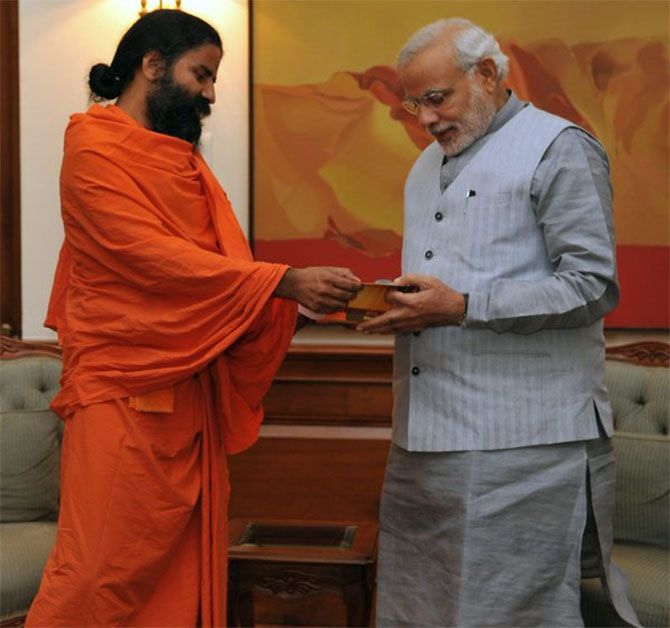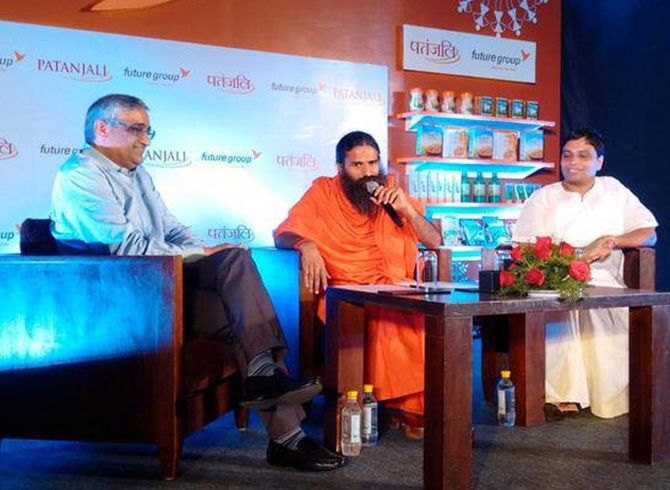Patanjali doesn't employ any fancy managers with MBA degrees, says Indrajit Gupta.

Of late, Devendra Chawla, the president of the Future Group, says he has been besieged by meeting requests from a clutch of chief executive officers (CEOs) of fast-moving consumer goods (FMCG) companies.
And, there's only one thing that they all seem to want to talk about: the phenomenon called Patanjali.
Yes, it is a phenomenon. And the numbers tell only half the story. Last year, Hindustan Unilever grew its $4.5 billion (about Rs 3 lakh crore) top line by five per cent.
Patanjali Ayurved, on the other hand, added almost the same quantum of revenue, and, in the process, is likely to double its revenues to Rs 5,000 crore (Rs 50 billion) by end of March.
It is clearly the fastest growing FMCG firm in the country, with the widest product portfolio. The Future Group, which announced its tie-up to stock Patanjali's wide range of products last year, is furiously reworking its sales forecasts because the products are simply flying off the shelves.
In less than two years, the Future Group, says it expects to sell nearly Rs 1,000 crore (Rs 10 billion) worth of Patanjali products.

That's the kind of traction that most former FMCG veterans like Mr Chawla have ever seen in their entire career.
Then there's the anecdotal stuff. Like the dilemma that a director in a leading FMCG multinational finds himself in.
His aged parents have apparently been haranguing him to jettison the toothpaste brand made by his own company and switch to Patanjali.
The battle, he says, isn't just in the marketplace, but within his own family!
For the FMCG companies though, the disruption that Patanjali has wrought is for real, because it challenges many of the long-held assumptions in the classical FMCG world.  Patanjali doesn't employ any fancy managers with MBA degrees. Instead of selling to the retail trade through distributors, it has its own branded outlets around the country. (It signed up only recently to sell through the Future Group's network.)
Patanjali doesn't employ any fancy managers with MBA degrees. Instead of selling to the retail trade through distributors, it has its own branded outlets around the country. (It signed up only recently to sell through the Future Group's network.)
Its production units are relatively modest. The savings in distribution margins and the low overheads straightaway translate into a 20-25 per cent cost advantage.
That gives the company the leverage to price its products at least 15-30 per cent cheaper than other branded competition.
But, for its growing base of users, it isn't just about a cheaper price. They genuinely believe in the goodness of ayurveda and the natural, chemical-free products.
Patanjali spends only a tiny fraction of its revenues on mass media advertising.
Instead, it lets its loyal consumers derive their confidence from the endorsements that Baba Ramdev subtly provides in the midst of his yoga asanas through the day on Sanskar channel.
 And experts who have interacted with Baba Ramdev vouch for the fact that he knows his products well.
And experts who have interacted with Baba Ramdev vouch for the fact that he knows his products well.
More importantly, the brand's source credibility is also boosted by the fact that in many cases, it has the ringing endorsement of the older generation in most Indian families - and that carries a lot more weight than the crores invested in advertising.
Then, there's the seemingly dowdy packaging. Guess what? Most people see it as a signal that the product is authentic.
For an entire generation of FMCG managers, who have grown up on a different menu, the Patanjali phenomenon is proving to be a bit hard to digest.
How could a baba, sometimes ridiculed for his idiosyncrasies, take their game away?
No wonder there is plenty of chatter inside FMCG boardrooms.
Some believe that the Patanjali phenomenon will soon start to peter out. And they have good reasons to believe that.
Patanjali has expanded its portfolio to over 400 stock-keeping units (SKUs), entering categories like noodles and skin care, in the process stretching their equity far more than they perhaps should.
 Much of this criticism may well be true, except that it isn't just about Baba Ramdev's magic or about the power of herbal and ayurveda alone. It is much deeper.
Much of this criticism may well be true, except that it isn't just about Baba Ramdev's magic or about the power of herbal and ayurveda alone. It is much deeper.
In a recent conversation, Damodar Mall, a retail pro with an astute understanding of what consumers want, came up with an interesting hypothesis.
The best way, he says, is to look at three other adjacencies.
Ever wondered why Amish Tripathi's The Shiva Trilogy became the fastest selling book series in the history of Indian publishing, with 2.5 million copies in print and over Rs 70 crore in sales?
Or why Devdutt Patnaik is such a hit on the speaking circuit? As consumers get confident, they like contemporary things that spring from their cultural identity, says Mr Mall.
The success of Amul, on the other hand, is about the timeless appeal of "in your face" value or authenticity. And finally, the concept of Ayush, or the appeal of all things natural, and the concept of wellness.
Patanjali is the multiplier effect of these three appeal vectors.
Most people don't seem to get that and thereby miss out the fountainhead of success in India's consumer market.
And perhaps that's because they don't teach that in business school.
The writer is co-founder of Founding Fuel, a learning platform that serves a community of entrepreneurial leaders.
Photographs, courtesy: Patanjali











